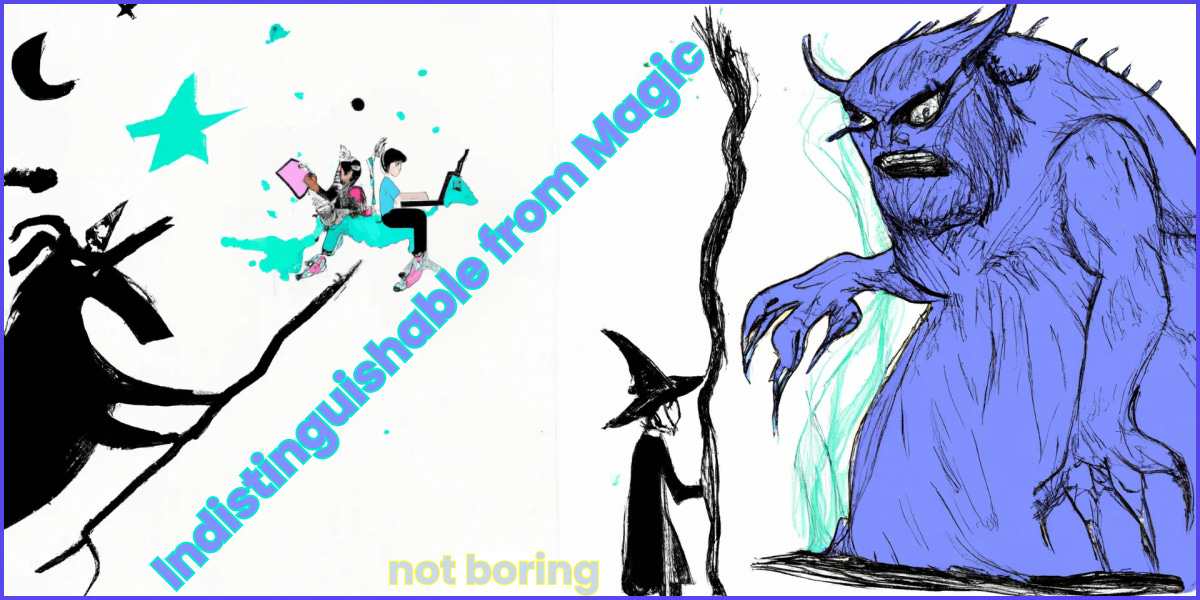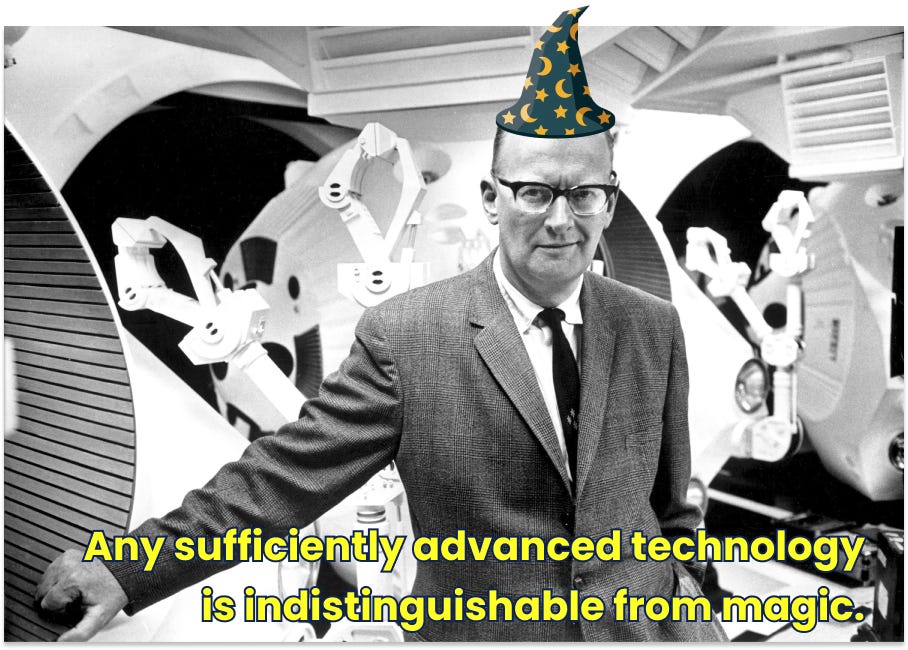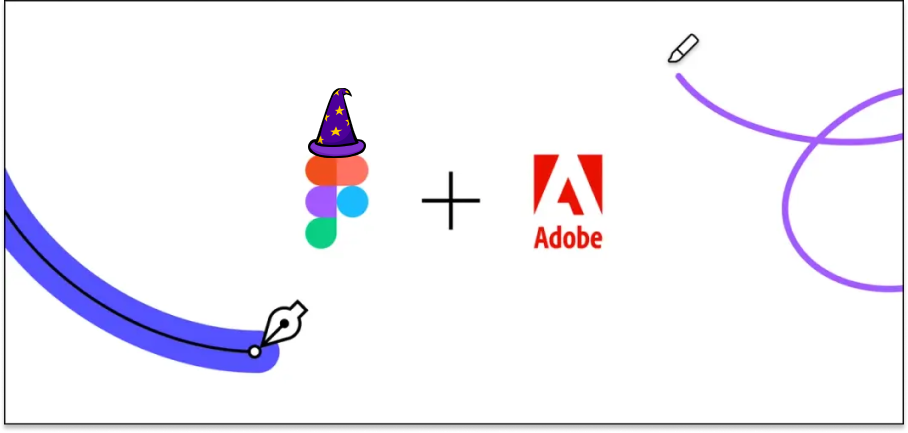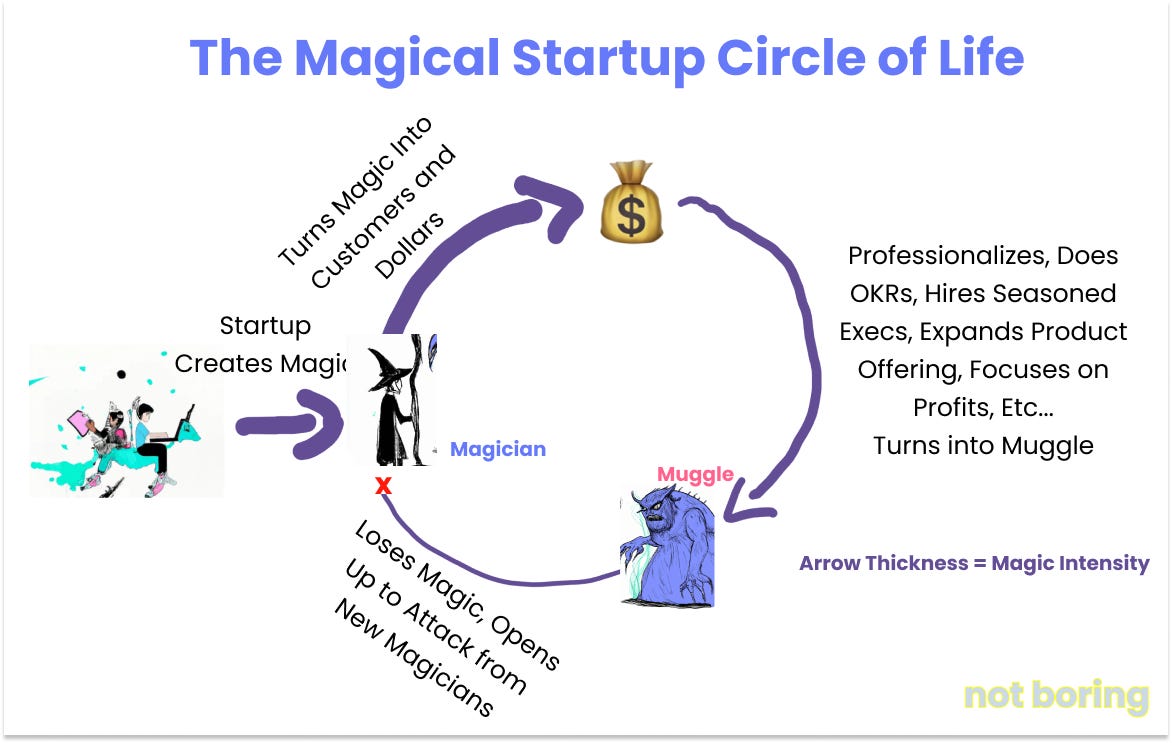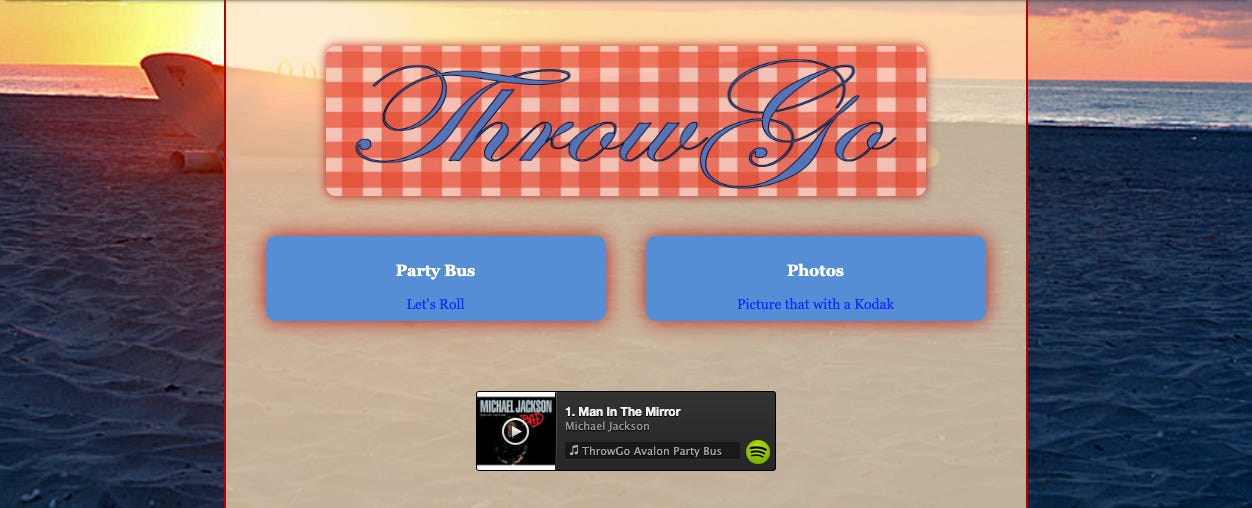Not Boring by Packy McCormick - Indistinguishable from Magic
Indistinguishable from MagicMagical Technology: iPod, Spotify, Figma, AI Art, Arc, web3, and beyond
Welcome to the 1,142 newly Not Boring people 🤯 who have joined us since the last post I wrote in August — I need to take breaks more often! If you haven’t subscribed, join 153,359 smart, curious folks by subscribing here: 🎧 To get the magic right in your ears, listen on Spotify or Apple Podcasts Today’s Not Boring is brought to you by… Polywork Polywork is a place to discover opportunities to collaborate with other professionals. Existing networks like LinkedIn focus on connecting us to 9-5 opportunities — but where do you go to find opportunities to speak on podcasts? Or discover partners for your side project? Check out who at Google or Netflix is open to angel investing or starting a company? If LinkedIn is built for the 9-5 generation, Polywork is built for the collaboration generation. It’s been in private beta for just over a year, but this week it publicly launched for everyone, was #1 on Product Hunt, and announced its Series B funding. So what’s its magic? Polywork understands that as professionals, our list of job titles don’t do a good job of telling our full stories. Furthermore, it’s purpose built for professionals who want to connect with one another beyond their 9-5. There’s a growing network of amazing professionals from places like Figma, Snapchat, and Github all sharing what they want to do — making it incredibly easy to collaborate with anyone, on anything. Hi friends 👋, Happy Monday! Last week, I asked people on Twitter for the best essays and blog posts they’ve ever read and they delivered. You should check out the replies. There’s gold in there. I think as a result of reading so much great stuff, I had more fun writing this week’s piece than I’ve had writing in a long time. It flowed. I hope you like this one, and if you do, that you’ll share it and spread the magic. Let’s get to it. Indistinguishable from Magic(Click that link 👆 to read the full thing in your browser) There’s a famous quote from “English science-fiction writer, science writer, futurist, inventor, undersea explorer, and television series host” Arthur C. Clarke. You probably already know the one I’m talking about:
That’s been quoted so many times that it’s lost its meaning. “Yeah, yeah, technology can be really cool. I get it.” Personally, when I read it, I think about the technology itself, but that’s not the important part. The important part is the magical experience a sufficiently advanced technology makes people feel. Here’s what I mean in an example. Sending a rocket into space with people on it and bringing them back to Earth safely, is, at least to my non-rocket scientist brain, indistinguishable from magic. But the technology itself wasn’t nearly as magical as watching, two months into COVID lockdowns, SpaceX and NASA send humans to space from American soil for the first time in nearly a decade.  While the launch itself was a feat of engineering, the fact that watching it could transport me from the tiny apartment we’d been locked in for two months and into orbit might as well have been a feat of real, honest-to-Merlin magic. I’ve been writing a lot about technology’s role in making the future better, about how it can improve metrics like lifespan and economic output and lift people out of poverty. As Balaji wrote, “If the proximate purpose of technology is to reduce scarcity, the ultimate purpose of technology is to eliminate mortality.” That’s all incredibly important and I’m going to keep writing about it. But I also think that, technology can play another, equally important role: help people experience magic. Rocket launches are big, once-in-a-while events, but technology can create more quotidian magic, too. Jumping into a chat room with my friends on AIM when I was younger was magical. Meeting someone at a party in college and coming home to the Friend Request on Facebook was magical. Pulling up all of the world’s music on Spotify from my phone for the first time was magical. Today, getting the prompt right and watching what DALL•E and Stable Diffusion come back with is magical. Jumping into a well-curated space in OnCyber is magical. Even using the browser I’m using right now – Arc by The Browser Company – feels magical. Magic can, even must, be a strategy for startups. It’s something they can uniquely create, that incumbents often can’t. Last week, Figma announced that Adobe was acquiring the company for $20 billion (plus an extra $2 billion in potential options). Figma is just a decade old. It came into a space that Adobe completely dominated. If you had evaluated Figma vs. Adobe at the time, you would have pointed to Adobe’s network effects, the high switching costs for designers, and its more richly developed product suite. What you might have underestimated was Figma’s magic. I’m not a designer. I tried using Photoshop once (evidence below) and gave up. It was too complicated. There were too many features. I never knew what layer to use. Then, when I started writing this newsletter, I tried Figma. It was magic. I could actually do things – not well, but I could do them – and all of a sudden, visuals became part of Not Boring’s identity. All of it, right there in the browser. I, never before a target customer for a design tool, became part of the TAM. I created more myself, and told other people about Figma, too. There are a lot of reasons that Figma succeeded in the face of a much bigger competitor to the point that that competitor was forced to pay 50x ARR to stop the advance. Practically everyone in tech has shared their opinion in the past few days. Kevin Kwok broke many of those reasons down in his classic Why Figma Wins and I agree with all of it. But what the piece doesn’t address – even though the mechanics Kevin covers are inputs to it – is the magic powers that Figma gives its users. Just look at all of the results for “Figma magic” on Twitter. As if on cue, Adobe’s Chief Product Officer, Scott Belsky, tweeted: “Figma will continue to operate w/ autonomy, continuing to work their magic.” “Any sufficiently advanced technology is indistinguishable from magic.” The sufficiently advanced part of that gets less credit than it deserves, too, and I think it holds the key to why startups have a magic advantage over incumbents. Kwok wrote that Figma’s network effects were “made possible by Figma’s key early choices like:
Starting with a blank canvas, Figma was able to choose the (right) sufficiently advanced technologies at that moment in time without worrying about two decades’ worth of technical debt. As a young startup, it could focus on creating magic and ride that magic until, one day, it, too, had too much technical debt, until we were all too used to its technology to be awed, and until the demands of the public markets forced it to make the kinds of practical business-driven decisions that kill the magic. Design Twitter melted down upon hearing the news of the Adobe acquisition, fearing that Adobe would kill everything that made the product beautiful. But whether Adobe accelerates the downfall or not (and I think both Scott Belsky and Figma CEO Dylan Field are good enough that it won’t), the magic would have, eventually, degraded anyway. It’s the Magical Startup Circle of Life. A startup, if it’s lucky, creates magic, turns that magic into dollars, and transitions to life as a successful Big Muggle Company, capable of enormous profits and power but no longer able to conjure magic. Then a new Magician comes along, using sufficiently advanced technology to build something indistinguishable from magic, and uses that magic as a wedge to challenge the Big Muggle Company. My friend Nathan Baschez’s conspiracy theory captures the idea well:  When I decided to write a piece on magical tech a few weeks ago, it was more negative. The draft I started was titled “Where Did the Magical Tech Go?” It was inspired by personal frustration and a wave of tweets that proved I wasn’t alone.  I was planning to bemoan the loss of magic in the products I once loved and try to figure out why the technology I use isn’t as magical as it once was. But that’s not what’s happening. What’s happening is more fascinating. The last generation of magical products has matured, turned into Muggles, and in so doing, has cleared space for a new cohort of Magicians. So let’s take a trip down Memory Lane to remember and celebrate those once-magical products, before getting excited all over again about the new magic being created today. The Last Era’s MagicExactly one decade ago, in the summer of 2012, I taught myself to “code” and spun up a website for the party bus “startup” I ran, ThrowGo. Each weekend in the summer, I’d rent party buses to take other young New Yorkers from the city to Avalon, NJ and the Hamptons. As you can see, the website was horrendous, but to me, it was magical. Instead of having to deal with a wave of texts while at my day job, people could just book directly online, and then pay on the bus via cash or a Square reader. Riders could #throwgo on Instagram and the photos (usually) automatically got pulled into the site, where they could relive half-drunk memories (or hit themselves with an extra dose of FOMO). And with a nifty little Spotify embed, anyone could add songs to the playlist that we’d listen to on the ride. Spotify was particularly magical. I grew up in the era of dial-up and Napster and Limewire. I was used to having to wait minutes while a song downloaded, then doing the same thing 14-20 times (you could try to do them all at once, but then they all slowed down) before burning them onto a CD, which I could play in the car until it got so scratched that it didn’t work anymore or until I was sick of the songs. Sometimes, I’d download a song and it wasn’t what I wanted. Other times, I couldn’t download the song at all. When iTunes came out, it at least guaranteed that I’d get the song I wanted, even if it still took some time to download and cost a then-pricey $0.99 per track. It was definitely better, and the iPod, with its 1,000 songs in my pocket, was pretty damn magical.  I remember the first time I listened to an iPod. It wasn’t mine. It was also on a bus, on a school field trip to Killington, Vermont. I sat next to my friend Pat Wilkinson, because he was one of my best friends, and also because he’d just bought an iPod. He let me listen to it, and while our taste in music didn’t overlap perfectly (his was more refined, he had older siblings), I scrolled that scroll pad until I found something that we both liked:
I clicked, the wheel clicked back, and the song played. Magical. But I don’t think I’ve thought about that moment until I weaved my way there a couple paragraphs ago. Typing “iTunes” triggered “iPod” in my brain, and the memory came back. Spotify was a different story. I’ve thought about my first Spotify experience a lot. I vividly remember the first time we used Spotify on the party bus. It was a Sunday. People were half-asleep, half-dead, just hoping to survive the trip back to the city. But as sometimes happened, a small group didn’t want to waste the last few party-able hours of the weekend before heading back to the office. So I plugged in my phone to the audio jack and connected to the Spotify app. I asked my friends Kirk and Nick what they wanted to listen to, we picked a crowd pleaser, searched it, and … there it was. To keep reading about the old magic and the new…Thanks to Dan for editing and to Polywork for sponsoring the magic! That’s all for today. We’ll be back with Weekly Dose of Optimism lucky number 13 on Friday. Have a great week! Thanks for reading, Packy If you liked this post from Not Boring by Packy McCormick, why not share it? |
Older messages
Weekly Dose of Optimism #12
Friday, September 16, 2022
Goalkeepers, Child Poverty, The Merge, Repurposed Power Plants, Giving It All Away
The Founder's Letter: Trevor Dryer & Miles Halady, Carbon Title
Thursday, September 15, 2022
Helping Builders Build More, Cleanly
Working Harder and Smarter
Monday, September 12, 2022
Or why more energy + software = progress
Weekly Dose of Optimism #11
Friday, September 9, 2022
Abolish NEPA, Diablo Days, Interracial Marriages, GUTS, and Abundant Robots
Weekly Dose of Optimism #10
Friday, September 2, 2022
Artemis I pt. II, EVs & Batteries, Seabed Mining, Intelligent Tools, Passion & Pain, and Dude Where's My Flying Car?
You Might Also Like
Standing on the other side of goodbye
Friday, February 28, 2025
Little moments that make me question: have I moved away or come home? ͏ ͏ ͏ ͏ ͏ ͏ ͏ ͏ ͏ ͏ ͏ ͏ ͏ ͏ ͏ ͏ ͏ ͏ ͏ ͏ ͏ ͏ ͏ ͏ ͏ ͏ ͏ ͏ ͏ ͏ ͏ ͏ ͏ ͏ ͏ ͏ ͏ ͏ ͏ ͏ ͏ ͏ ͏ ͏ ͏ ͏ ͏ ͏ ͏ ͏ ͏ ͏ ͏ ͏ ͏ ͏ ͏ ͏ ͏ ͏ ͏ ͏ ͏ ͏ ͏ ͏
A New EBITDA Adjustment to Drive Business Selling Price (a short video)
Friday, February 28, 2025
THE EXIT STRATEGIST A New EBITDA Adjustment to Drive Business Selling Price (a short video) Click Here to Watch Our Short Video The Key to driving strategic value in the sale of a technology company is
The Daily Carnage Show 🎙️
Friday, February 28, 2025
Podcast inside.
"Notes" of An Elder ― To Dispense Love (A Special Gift Just for You Inside)
Friday, February 28, 2025
Love is the most powerful force we possess.
What it takes to get paid by YouTube, TikTok and other social platforms
Friday, February 28, 2025
Digiday has the lowdown on which platforms are offering what revenue share models and creator funds. February 28, 2025 PRESENTED BY What it takes to get paid by YouTube, TikTok and other social
🔔Opening Bell Daily: Testing US exceptionalism
Friday, February 28, 2025
US equities are under-performing the rest of the world to start 2025.
Guest Post: The NCAA's eligibility rules may be in serious legal trouble. Here's why:
Friday, February 28, 2025
One legal expert thinks that "bad facts could lead to a bad law". And it's the NCAA's fault.
Meet Your NEW AI Co-Pilot: Ember
Friday, February 28, 2025
It's pre-trained on tons of ClickBank products... View in browser ClickBank Have you heard of Ember, ClickBank's premier AI copilot? Simple, effective, and built to fuel your business, Ember is
Definitely maybe
Friday, February 28, 2025
Crystallizing the value of Caesars Digital comes with complications ͏ ͏ ͏ ͏ ͏ ͏ ͏ ͏ ͏ ͏ ͏ ͏ ͏ ͏ ͏ ͏ ͏ ͏ ͏ ͏ ͏ ͏ ͏ ͏ ͏ ͏ ͏ ͏ ͏ ͏ ͏ ͏ ͏ ͏ ͏ ͏ ͏ ͏ ͏ ͏ ͏ ͏ ͏ ͏ ͏ ͏ ͏ ͏ ͏ ͏ ͏ ͏ ͏ ͏ ͏ ͏ ͏ ͏ ͏ ͏ ͏ ͏ ͏ ͏ ͏ ͏ ͏
+34% more leads (study)
Friday, February 28, 2025
I love that you're part of my network. Let's make 2025 epic!! I appreciate you :) Today's hack +34% more leads (study) Diego Chacon decided to test what specific format of the same offer (
